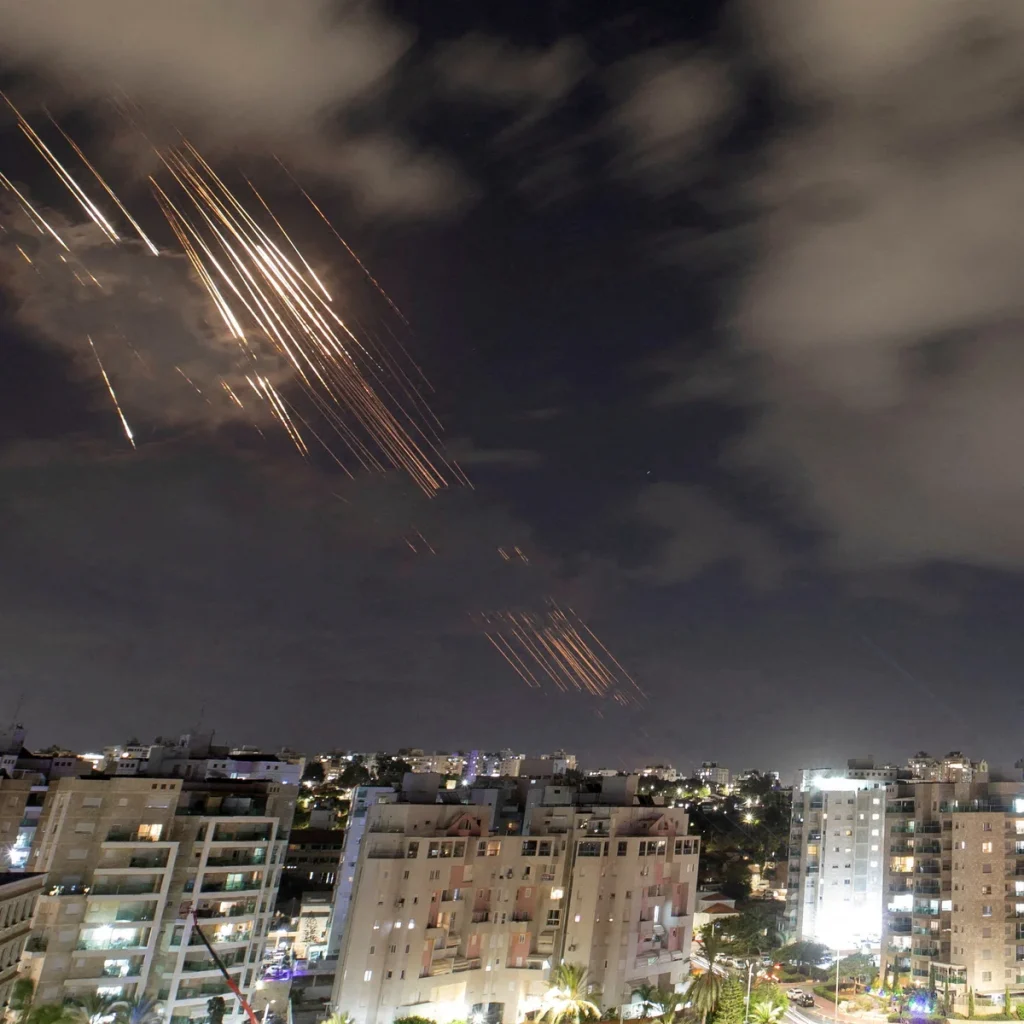By Agency Report
As payback for the barrage of ballistic missile attacks by the Islamic Republic, Israel attacked Iran with airstrikes targeting its military infrastructure early Saturday, killing two in Tehran.
Iran confirmed the deaths of two military personnel following Israeli airstrikes, according to state media, as tensions escalated between the two nations.
Responding to Iran ballistic missile attacks on Israel on October 1, Israeli Defense Minister Yoav Gallant speaking to pilots and air crews at the Hatzerim Airbase, vows that “after we strike in Iran, everyone will understand what you did in the preparation and training process.”
“Everyone who dreamed a year ago of beating us and attacking us paid a heavy price and is no longer in that dream,” he stated this three days ago.
Related post: Israel vows retaliation as Iran’s missiles hit its territories
Footage circulating on social media showed Tehran’s air defense systems activated, illuminating the early-morning sky. The Israeli government stated that its strikes were in retaliation for an earlier attack allegedly launched by Iran.
Iranian media identified the victims as Jahandidah and Staff Sergeant Shahrokhifar, both members of the Iranian armed forces.
In a statement, Iran’s Foreign Ministry vowed to respond, citing Article 51 of the United Nations Charter, which upholds the right to self-defense. “Iran, based on the inherent right of self-defense, considers itself entitled and obligated to defend against foreign acts of aggression,” the statement read, describing Israel as the “main instigator” of instability in the region.
The Israeli assault reportedly involved over 100 drones and missiles, underscoring the scale of the operation. Israeli officials, including Prime Minister Benjamin Netanyahu and Defense Minister Yoav Gallant, closely monitored the attack from the military’s command center in Tel Aviv.
The latest strikes represent a dangerous escalation in the longstanding hostilities between Israel and Iran, which have seen rising military confrontations across the region.
Israel Hits Iran
The Israeli military said its aircraft targeted facilities that Iran used to make the missiles fired at Israel as well as surface-to-air missile sites. There was no immediate indication that oil or missile sites were hit — strikes that would have marked a much more serious escalation — and Israel offered no immediate damage assessment.
Explosions could be heard in the Iranian capital, Tehran, though the Islamic Republic insisted they caused only “limited damage” and Iranian state-run media downplayed the attacks. Iran’s army said two of its troops had been killed in the attack, Iran’s Al-Alam television reported.
Still, the strikes risk pushing the archenemies closer to all-out war at a time of spiraling violence across the Middle East, where militant groups backed by Iran — including Hamas in Gaza and Hezbollah in Lebanon — are already at war with Israel.
Following the airstrikes, Iran’s Foreign Ministry issued a statement saying it had a right to self-defense, and “considers itself entitled and obligated to defend against foreign acts of aggression.”
The first open Israeli attack on Iran
“Iran attacked Israel twice, including in locations that endangered civilians, and has paid the price for it,” said Israeli military spokesperson Rear Adm. Daniel Hagari.
“We are focused on our war objectives in the Gaza Strip and Lebanon. It is Iran that continues to push for a wider regional escalation.”
The strikes filled the air for hours until sunrise in Iran. They marked the first time Israel’s military has openly attacked Iran, which hasn’t faced a sustained barrage of fire from a foreign enemy since its 1980s war with Iraq.
Israel is also widely thought to have been behind a limited airstrike in April near a major air base in Iran in which the radar system for a Russian-made air defense battery was hit.
Saturday’s attack came as part of Israel’s “duty to respond” to attacks on it from “Iran and its proxies in the region,” Hagari said.
“The Israel Defense Forces has fulfilled its mission,” Hagari said. “If the regime in Iran were to make the mistake of beginning a new round of escalation, we will be obligated to respond.”
Israel’s attack effectively sent the message to Iran that it would not remain silent, while not taking out highly visible or symbolic facilities that could prompt an significant response from Iran, said Yoel Guzansky, a researcher at Tel Aviv’s Institute for National Security Studies who formerly worked for Israel’s National Security Council.
At the same time, it also gives Israel room for further escalation if needed, and the targeting of air defense systems weakens Iran’s capabilities to defend against future attacks, he said, adding that if there is Iranian retaliation, he expects it to be limited.
“There’s more chances of Iranian restraint because of their interests, because of pressure from the outside, and because of the nature of the Israeli attack … that allows them to save face,” he said.
In the aftermath of the strikes, the streets of the Iranian capital were calm, children went to school and shops opened as usual, with the only sign of concern being long lines at the gas stations — a regular occurrence in Tehran when military violence flares or during natural disasters when people stock up on fuel.
Israel had hit the intelligence headquarters of Hezbollah in Beirut and was assessing the damage on Friday after a series of strikes on senior figures in the group that Iran’s Supreme Leader dismissed as counterproductive.
Oil prices have risen on the possibility of an attack on Iran’s oil facilities as Israel pursues its goals of pushing back Hezbollah militants in Lebanon and eliminating their Hamas allies in Gaza.
The air attack on Beirut, part of a wider assault that has driven more than 1.2 million Lebanese from their homes, was reported to have targeted the potential successor to the leader of Iran-backed Hezbollah, Sayyed Hassan Nasrallah, killed by Israel a week ago.

